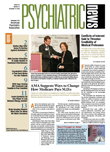The best of times, the worst of times. Good news: Congress passes a bill ending discrimination against psychiatry in health insurance coverage. The discriminatory copay in Medicare is scheduled to end. Bad news: As I write this, the global economy is in turmoil, leading inevitably to increases in the incidence and exacerbation of anxiety and mood disorders. There are negative stories about psychiatrists in the newspapers. There is no better time to disseminate positive information about psychiatry. Employers with 50 or more employees are considering how to adapt to the new parity law if their current health insurance plans include mental health benefits.
Faced with today's faltering economy, many employers are trying to find ways to survive and have been cutting back on their workforce. The employees who remain must do more work with fewer resources. They are anxious about their jobs, their pensions, their children's educations. I have been interviewed by the Wall Street Journal and other newspapers about the impact of the economic situation on people who need psychiatric care. The business community is taking a particular interest in the conjunction of health insurance change and increased stress on employees.
Even before these changes took place, people were interested in information about mental disorders and treatments. Stigma has decreased. Now is an opportune time to step up our efforts to educate the public, employers, and policymakers.
As I told the Wall Street Journal, the United States has developed from a manufacturing economy into an economy that depends on cognitive and interpersonal skills. The new economy requires employees who are alert and pleasant. Customers call airlines to make reservations. They call financial companies, worried about their holdings. Patients come to medical facilities and interact with clerks, technicians, nurses, physicians, orderlies, dieticians, and many kinds of therapists. Employers describe a phenomenon called “presenteeism”: unlike those too incapacitated to come to work, employees who experience depression, anxiety, or other mental health symptoms may come to work, but have little energy or enthusiasm. They are physically present, but they can't do their jobs properly. They can't concentrate. They don't really feel like talking to anyone, much less helping them. Faced with employees like these, some customers and patients will take their business elsewhere, just when businesses and organizations need them more than ever.
Dr. Gary Weinstein of Louisville, Ky., the speaker-elect of the APA Assembly, agreed to meet with a group of employers a couple of months ago. He found an eager audience. Not only benefit managers, but also corporate executives showed up, stayed, listened, and asked for more. Employers, like the general public, get all sorts of messages and have all sorts of misconceptions about psychiatry. For instance, if they offer or improve mental health benefits for their employees, will they be inundated by the“ worried well” or bored and lonely family members of employees, demanding endless courses of psychotherapy? The answer is no. Everybody gets“ depressed” from time to time; they can snap out of it by talking to a friend, watching something enjoyable on TV, or just keeping a stiff upper lip. Why do some people have to have treatment for depression? What kind of treatment do they need? Does treatment work?
Now that the parity bill has passed, it is our job to convince employers to maintain or adopt mental health coverage for their employees. And it is essential that as they tell us their concerns, we listen and respond, not just lecture them.
The American Psychiatric Foundation and APA formed the Partnership for Workplace Mental Health several years ago. They laid the groundwork and developed the resources to reach out to employers. The Partnership for Workplace Mental Health is available to serve members interested in conducting business outreach, as Dr. Weinstein did.
The partnership has all the information you need. There is a quarterly newsletter,
Mental HealthWorks, with excellent articles on subjects ranging from alcoholism in the workplace to the success of a law firm in addressing depression in its ranks. The next issue will highlight the advantages of mental health coverage to businesses, with case examples of businesses that have successfully implemented parity provisions in the health insurance of their employees. To receive a free subscription, send an email to
[email protected] with “free subscription by e-mail” or “free subscription by mail” in the subject line. In your message, provide your postal address and telephone number. The newsletter, both current and archived articles, and other information about the partnership are on APA's Web site.
The staff of the partnership stands ready to offer advice on how to use partnership resources to reach out to businesses, arrange meetings with employers, and decide what content to include. They can provide materials for you to use and to hand out. You may well garner some referrals if you want them.
Additional partnership resources available on the Web include “A Mentally Healthy Workforce: It's Good for Business,” which helps articulate the business case for investing in mental health care, calculators that show employers exactly how much money they are losing due to employees' depression and alcohol abuse (quantifying the return on investment for providing quality treatment), and links to HealthyMinds.org, APA's informational site for the public.
This is another opportunity for us to do well by doing good. ▪

